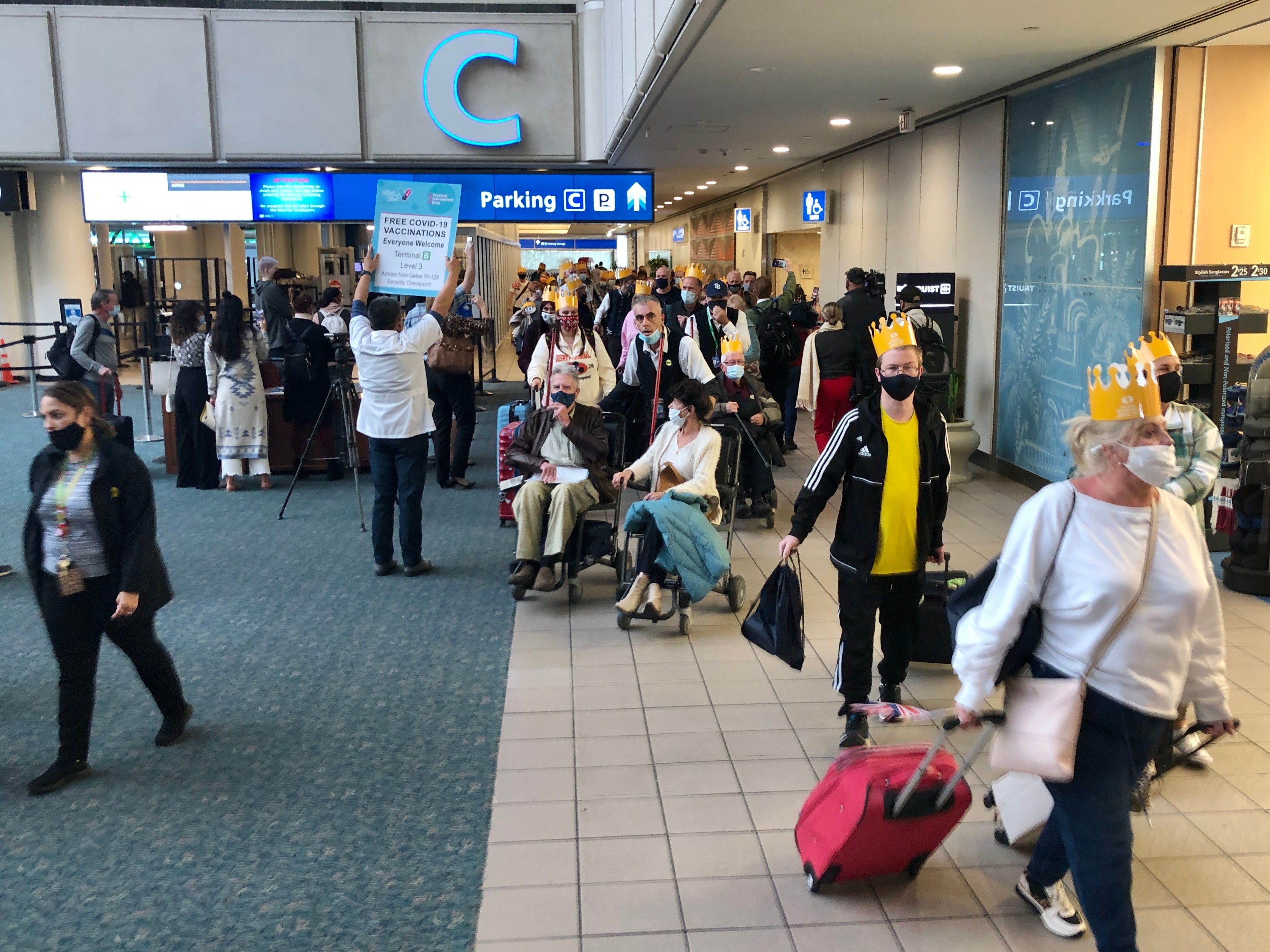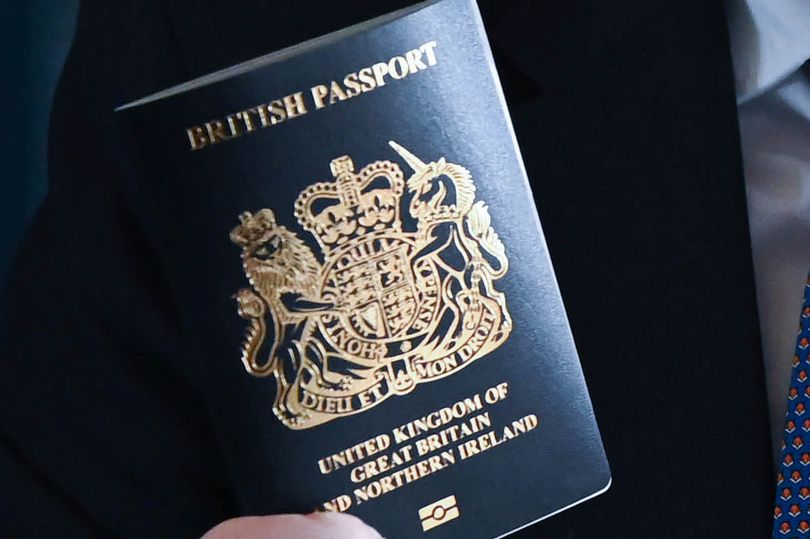Can you explain America’s confusing Covid travel rules?
Simon Calder answers your questions on proving your vaccination status in the US, getting to St Vincent, and post-Brexit passports


QI am fully vaccinated and am travelling to the US next Tuesday, 16 November. I am so confused by what is required. Navigating different websites with conflicting information is exhausting. I would welcome your expert view, particularly as you have been through the process.
Helen
A As I have said many times during the pandemic, definitive information on coronavirus travel restrictions comes from the government that imposes the rules – not from any other source.
I successfully entered the US on Monday 8 November, the first day that British travellers were allowed in. My experience, and that of the other UK visitors I interviewed, was that the rules are reasonably clear and compliance for a fully vaccinated traveller is straightforward.
As with arrivals to the UK, the frontline checking for travellers to the US is conducted by airlines, who will pre-screen you. They are required by the American authorities to assess your eligibility based on two criteria.
First, a pre-departure test. As you are travelling on Tuesday, you will need one taken on that day, or on Saturday, Sunday or Monday. The US does not accept self-administered tests (unless supervised on video by a certified American provider), and I strongly recommend a rapid and relatively cheap lateral flow test on the day of travel at your departure airport.
Next, you must prove your vaccination status. The NHS Covid pass letter is good for this, but if you do not already have one there is unlikely to be time to order a copy online to be posted to you. Instead, you can download your status from the NHS website or get digital proof on the NHS app.
You must also complete a form called the “Combined Passenger Disclosure and Attestation to the United States of America” – I have created a short link to it, bit.ly/AttestCDC. It is required in paper form; you can complete the details online but you cannot sign it, so you must print it out. It is at first glance a baffling form. But fully vaccinated adults should tick Section 1, Question 1 and Section 2, Question 1. On behalf of unvaccinated children aged two-17 travelling with them, the relevant parts are Section 1, Question 4; Section 2, Question 2, second option; Section 4, all boxes in the shaded section. Then name, signature and date on page 5 of the form.
On arrival, US Customs and Border Protection might ask for proof of testing and/or vaccination. My NHS Covid pass letter was closely scrutinised by officers, but that was because I was arriving overland with no pre-screening and possibly had some novelty value.
Arrivals I have spoken to say they cleared passport control swiftly and easily, and I predict the same will happen for you.

Q I’m flying out to New York this weekend to spend six weeks in the northeastern US. There is enormous excitement here after a two-year wait! Have you had any issues with using your NHS Covid Pass to access venues in New York, given that they have their own system, the Excelsior Pass?
If so, what do I need to do to make sure my experience is as seamless as possible?
James D
A I was in New York State this week but not in NYC. This single state provides an excellent example of how fragmented things are in the US. While in upstate New York, mask-wearing is optional for anyone who is fully vaccinated, and I faced no controls entering premises. But in the biggest American city, things are very different: Covid rules in New York City stipulate that for indoor dining, museums, aquariums, zoos and performance venues, “people 12 and older are required to show identification and proof they have received at least one dose of a Covid-19 vaccine”.
The Excelsior Pass you mention is actually a state-wide scheme that promises: “Secure proof of an individual’s Covid-19 vaccination record and negative test results.” But I have not been able to identify any way for foreign visitors to access the scheme.
So how do you prove your vaccine status? Well, in the US, everything is pretty analogue. Unlike the European Union, where the successful, multinational EU digital Covid pass is ubiquitous, there is no coherent nationwide system in the US – despite an attempt by New York State to promote such a scheme (known as Blueprint) based on its Excelsior Pass.
Carrying your NHS Covid pass letter, which conveniently is in English, should be sufficient. You can get one from the NHS in the UK nation you live in. Always carry your passport, too, because some people will want to see it as well as your proof of vaccination.

Q My airline has said in an email this morning: “The authorities in St Vincent have provided further guidance that Rapid PCR and self-administered tests will not be accepted as a valid test.” The St Vincent government website makes no mention of this. My test provider (Collinson) says the “Rapid” and standard PCR tests are identical. Finding someone to speak to at the airline for clarification takes longer than flying the Atlantic. Any thoughts?
“The Olderpreneur”
A As I have tried to do throughout the coronavirus pandemic: rather than relying on UK government or airline interpretations of what these infernally complicated Covid rules might be, it is always best to go right to the source. In your case, that is St Vincent’s National Emergency Management Organisation.
I presume you have had both coronavirus jabs, and that therefore the latest “protocol for the entry of fully vaccinated travellers to St Vincent and the Grenadines” applies to you. It was issued 10 days ago. The UK is considered relatively high risk, and therefore you “must arrive with a negative result of a Covid-19 (RT-PCR) test done no more than 72 hours or three days before arrival”. That term “three days” is unhelpful, so to be sure I suggest you have a PCR test comfortably within the 72-hour deadline (and note it is based on the time you arrive in St Vincent, not leave the UK).
Also unhelpfully, there is no mention of anything specifically to do with PCR tests. I am unaware of a “Rapid PCR” test as a separate entity. Some PCR tests are, indeed, rapid (I got a result within 103 minutes after a recent test at Heathrow), but they should all be analysed to the same high standards.
Possibly, somewhere in the bureaucratic chain “self-administered” and “rapid” may have been conflated. It appears that a pronouncement has been handed down ruling out DIY tests rather than those conducted by a medical professional. I am not surprised that this lovely Caribbean country is the latest to rule out DIY tests; they have scope for both accidental inaccuracy (I can’t swab like a professional) and, I am sorry to say, deliberate mischief – with impersonation one possibility.
I would never recommend a self-administered PCR test prior to departure, even where it is permitted, because of the risk that a result may be delayed. A proper airport test is the way to go. I am sorry if you have already booked a different test; I do all I can to urge travellers to book at the last minute because rules change so frequently and suddenly.

Q I am struggling to understand the passport rules. My daughter’s passport was issued on 24 March 2017 and expires on 24 August 2022. We return to the UK from France on 26 December. It will easily have more than six months left on, but if from the issue date it has just under three months – does it need to be renewed or not?
Name supplied
A For children’s British passports, there is only one post-Brexit disadvantage: the requirement to return from the European Union (and the wider Schengen Area, including Iceland, Norway and Switzerland) with at least three months remaining on the document. So your daughter’s passport is valid for travel to and from the EU for trips that end by 24 May 2022.
Your confusion is entirely understandable since a number of organisations that should know better have fuelled misapprehension about post-Brexit passport rules since the transition phase ended on 31 December 2020.
At the root of the problem is the fact that some adult British passports were issued for up to 10 years and nine months, under a laudable system that added unspent time on the old travel document to the validity of the new one. While the UK was part of the EU, this was irrelevant. But the decision to leave the European Union, and the Brexit deal that was negotiated, has left the UK as a “third country” to which a tougher rule applies: a passport is deemed to have expired once it reaches 10 years since the date of issue. (This has oddly been described as an “EU passport glitch” by some Brexit-supporting newspapers, even though it was an inevitable consequence of the withdrawal agreement.)
Clearly, children’s passports are unaffected, since the maximum they are valid for is five years and nine months. But the UK government – which has published a lot of misleading statements about passport validity after Brexit – set up a “passport checker” service that delivered false negatives on the validity of children’s passports until I finally persuaded officials to put it right back in July.
The other falsehood that some organisations (including airlines such as Ryanair) also put about is that British travellers to the EU need to have at least six months remaining on their passports when they enter. It has never been the case, and I am baffled that the “rule” is so widely shared.
For completeness, your daughter’s passport can also be used for journeys to and from the US – and many other countries – until its expiry date. But there are some countries, for example, Egypt, that require six months to be remaining on the date of entry to (or sometimes exit from) those countries.
Email your questions to s@hols.tv or tweet @simoncalder
Join our commenting forum
Join thought-provoking conversations, follow other Independent readers and see their replies
Comments
Bookmark popover
Removed from bookmarks